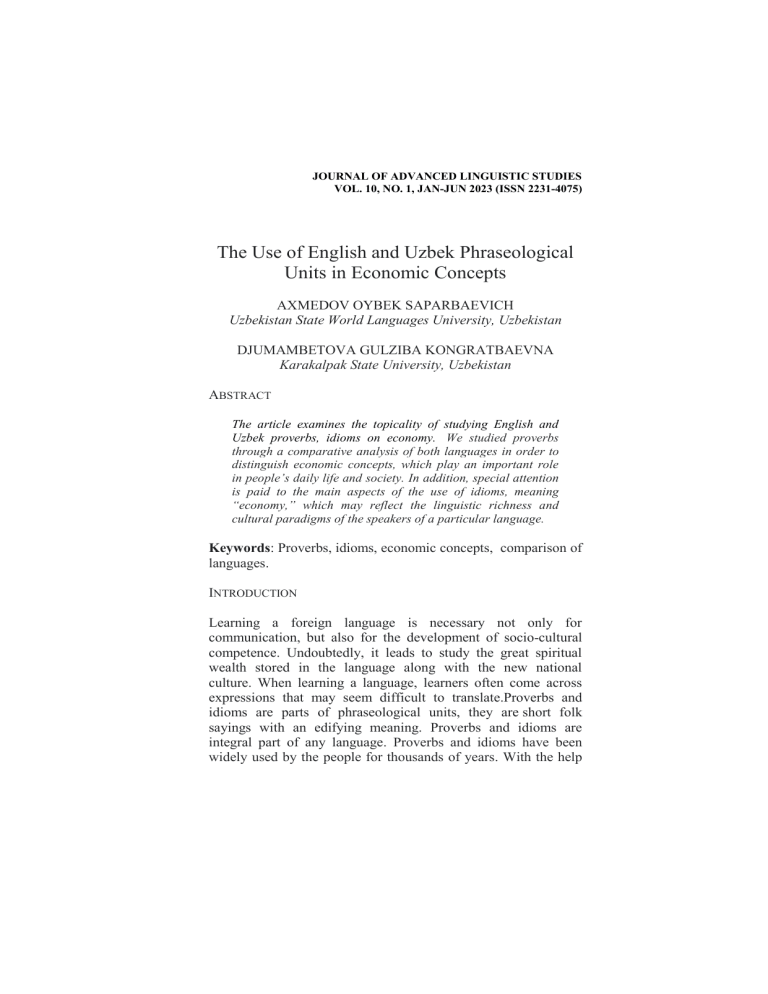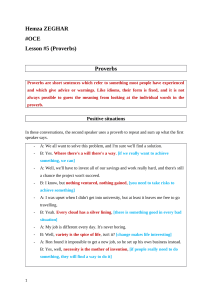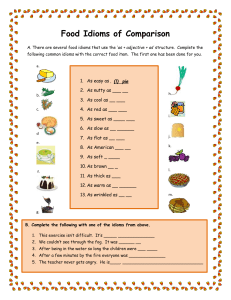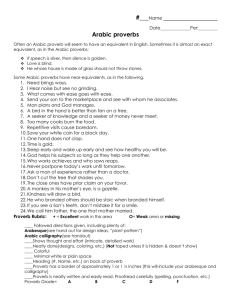
JOURNAL OF ADVANCED LINGUISTIC STUDIES VOL. 10, NO. 1, JAN-JUN 2023 (ISSN 2231-4075) The Use of English and Uzbek Phraseological Units in Economic Concepts AXMEDOV OYBEK SAPARBAEVICH Uzbekistan State World Languages University, Uzbekistan DJUMAMBETOVA GULZIBA KONGRATBAEVNA Karakalpak State University, Uzbekistan ABSTRACT The article examines the topicality of studying English and Uzbek proverbs, idioms on economy. We studied proverbs through a comparative analysis of both languages in order to distinguish economic concepts, which play an important role in people’s daily life and society. In addition, special attention is paid to the main aspects of the use of idioms, meaning “economy,” which may reflect the linguistic richness and cultural paradigms of the speakers of a particular language. Keywords: Proverbs, idioms, economic concepts, comparison of languages. INTRODUCTION Learning a foreign language is necessary not only for communication, but also for the development of socio-cultural competence. Undoubtedly, it leads to study the great spiritual wealth stored in the language along with the new national culture. When learning a language, learners often come across expressions that may seem difficult to translate.Proverbs and idioms are parts of phraseological units, they are short folk sayings with an edifying meaning. Proverbs and idioms are integral part of any language. Proverbs and idioms have been widely used by the people for thousands of years. With the help PHRASEOLOGICAL UNITS IN ECONOMIC CONCEPTS 217 of proverbs, our ancestors expressed their lifestyle, rich experience, mental state, attitude to society, history, economy, and their moral feelings over the centuries. Nothing can define a culture as clearly as its language and the language element that best captures the values and beliefs of a society is its proverb. A proverb is a short word that expresses traditional truth or useful wisdom. It is clear that proverbs are based on common sense or practical experience. Any proverb contains a self-evident wisdom and they may have been passed from generation to generation, mostly by word of mouth, or applied in writing (Djumambetova & Shakurova 2022: 34). In addition, proverbs are refined widely as a genre of folk and has become a concise, simple, but there are deep meanings with a few words over the centuries. They have a harmonious unity of content, form, rhyming in most cases, great importance and figurative meanings. The linguist W. Mieder defines a proverb in his book: A proverb is a short, generally known sentence of the folk, which contains wisdom, truth, morals, and traditional views in a metaphorical, fixed and memorisable form and which is handed down from generation to generation” (Mieder 1993: 27). In order to understand the meaning of proverbs or idioms in foreign language, it is better to find equivalent and compare them. The language comparison process is one of the most progressive method in linguistics. This method allows selecting phenomena and comparing them according to temporal and spatial borders. Comparative analysis is based on the presence certain linguistic similarities and differences as ways of expressing. Development of any society, prosperity of people’s life mostly depend on their economic thinking. Economics has always been important for humanity. This knowledge applies to all aspects of society, as it is the key to solving problems. If people manage economy wisely, their earning capacity improves effectively. Learning economic knowledge is necessary but literacy of terms, phrases, proverbs in the field of economy are also essential in modern life. 218 A. O. SAPARBAEVICH & D. G. KONGRATBAEVNA MATERIALS AND METHODS There is a broad thought about thrift in Uzbek expressions. In particular, there are many proverbs, which reflect economic concepts such as capital, debt, efficient economy, labor, land, and avoiding wastage. Moreover, proverbs express the main issue of economy - about wealth and its source, production, crafts, agriculture, animal husbandry. Although they are not formulated as a specific theory or doctrine, they clearly reflect the essence of the matter. In many proverbs and sayings, money, jewelry and trade are covered in a very wide and clear way. For example; Uzbek proverb «Pul pulni topar, yo’l yo’lni topar» and English equivalent of this proverb is “Money begets money.” The meaning of this old English saying and Uzbek proverb is that you can use your money to make more money. Your money can and will grow if you save and invest wisely and the growth will be steady and recognizable. You can grow your money by investing wisely, saving separately, managing your assets, and having patience. The real sense of the saying is money begets money. The following proverbs indicate that money plays a vital role in market economy; «Pul bo'lsa,changalda sho’rva», this Uzbek proverb means that if you have money you can afford a lot of things. The glorification of farming and handicrafts in proverbs can be found in the masterpieces of our people to almost all issues related to the economy, economic concepts, in which the most basic aspects of human activity are perfectly illuminated. Labor is the basis of wealth, therefore useful work aimed at creating material goods and services of an economy was highly valued in both language. For example English proverb “No pain, no gain” can be equivalent of Uzbek proverb “Mehnat, mehnatning tagi rohat.” Over the years, the main activity of the population has been agriculture and handicrafts, and as a result, the people's lifestyle has improved, and it has had a positive effect on the country's economy. Following proverb is given as an example; «Yerdan yerning farqi bor, yetmish ikki narxi bor», in this proverb, explanation about land rent is given clearly, because even in the scientific field, it is about the rent that appears due to the PHRASEOLOGICAL UNITS IN ECONOMIC CONCEPTS 219 proximity and distance of the land to the market and its natural fertility. Uzbek proverb «Tuya bir tanga — qani bir tanga, tuya ming tanga — mana ming tanga» clearly reflects the law of supply and demand in the economy as the Balance, proportionality is the most important concept in economics. “Nothing ventured, nothing gained”, this proverb conveys that greater value rewards are only for those who pay the price of risk and uncertainty. Risk, indeed, is necessary for achieving any type of gain. Risk plays a significant role in economy as risk propels economies and motivates entrepreneurs to innovate. Risk, for better and worse, is at the heart of economic growth, and successfully apportioning it – not avoiding it is the key to prosperity. RESULT AND DISCUSSION Language reflects the unique culture of its people; especially proverbs and sayings have a great role in reflecting the national identity and culture of this people. In addition, idioms used in the field of economics are not only about people, but also directions, actions, and about colors. The use of idioms sometimes convey certain cultural traditions and personalities. They are often used by native speakers more than non-native speakers, simply because they are more familiar with idioms and know the context in which they should be used. Idioms help people to express their opinions with just a few words [3:33]. Idioms serve not only to decorate speech; they also allow shortening long sentences to small set expressions. Idioms make speech more beautiful, lively and colorful. Economics has its own idioms that may at times be hard to understand. Using idioms is an important part of everyday conversation and communication in general. Idioms are often metaphorical or metonymic expressions. On the other hand, some idioms are used to express concepts in different fields, for example; economy, finance, medicine, education, etc.The following idioms and phrases contain words connected to human body and used in order to describe various economic concepts. These are quite frequent not only in economic and but also in all of the other areas of language usage; Bean-counter/ number- A. O. SAPARBAEVICH & D. G. KONGRATBAEVNA 220 cruncher: a person who works with numbers (i.e. accountant) Big wig: used for an important person in an organization. To stay on your toes-the meaning of this idiom; If you say that someone or something keeps you on your toes, you mean that they cause you to remain alert and ready for anything that might happen. To play it by ear-means to decide how to deal with a situation as it develops, rather than acting according to plans made earlier: To grease someone´s palm- means to give someone money in exchange for a favor; also, bribe someone. To pay through the nose-means to pay too much money for something: Bottom out: reach the lowest or worst point of something Take a nosedive: marked decrease in value Belt-tightening: reduction of expenses Sell like hotcakes/ flying off the shelves/roaring trade: sell very quickly in/into the black: successful or making money in/into the red: losing money, unprofitable CONCLUSION To conclude, thoughts and ideas, views and programs that are actively used by society in modern economic life. They reflect in proverbs, sayings and specific expressions created by the wisdom of the people for thousands of years. Although they have not risen to the level of theory and laws, they are of great practical, moral and educational value. This is an indication of finding the right and clear answer to all aspects of life and practice through folk masterpieces. In particular, they have answers to almost all questions related to economic concepts such as the market, market relations, wealth and its foundations, labor, agriculture, crafts, service industries, trade, money. This is a bright reflection of the spiritual perfection of our nation! PHRASEOLOGICAL UNITS IN ECONOMIC CONCEPTS 221 REFERENCES Akhmedov O.S. Linguistic analysis and translation problems of tax and customs terms in English and Uzbek languages. Doctor of Philology diss. Tashkent. 2016. Cambridge international Dictionary of idioms, Cambridge University Press. M.McCarthy, 1998 Djumambetova G. K., Shakurova F. Comparative analysis of Karakalpak and English proverbs. Journal of Academic Leadership. 2022. Djumambetova G.K., Orazmedova L. Comparative analysis of phraseological units in English and Karakalpak languages. International scientific and practical conference. Modern views and research. 2022 Mieder W. International Proverb Scholarship. New York: Garland Publishing, 1993. P. 27 SH.I. Mustafakulov, O.A. Rakhimberdiyev, M.SH. Egamberdiyeva. Explanatory dictionary of economic terms [Text]: dictionary. Tashkent: Innovative Development Publishing House, 2019. P. 489. Razzaqov A. «Iqtisodiytafakkursarchashmalari» Тоshkent, 2011 AXMEDOV OYBEK SAPARBAEVICH DSC, PROFESSOR, UZBEKISTAN STATE WORLD LANGUAGES UNIVERSITY, UZBEKISTAN. DJUMAMBETOVA GULZIBA KONGRATBAEVNA DOCTORAL STUDENT, KARAKALPAK STATE UNIVERSITY, UZBEKISTAN. E-MAIL: <GULZIBA2020@MAIL.RU>



